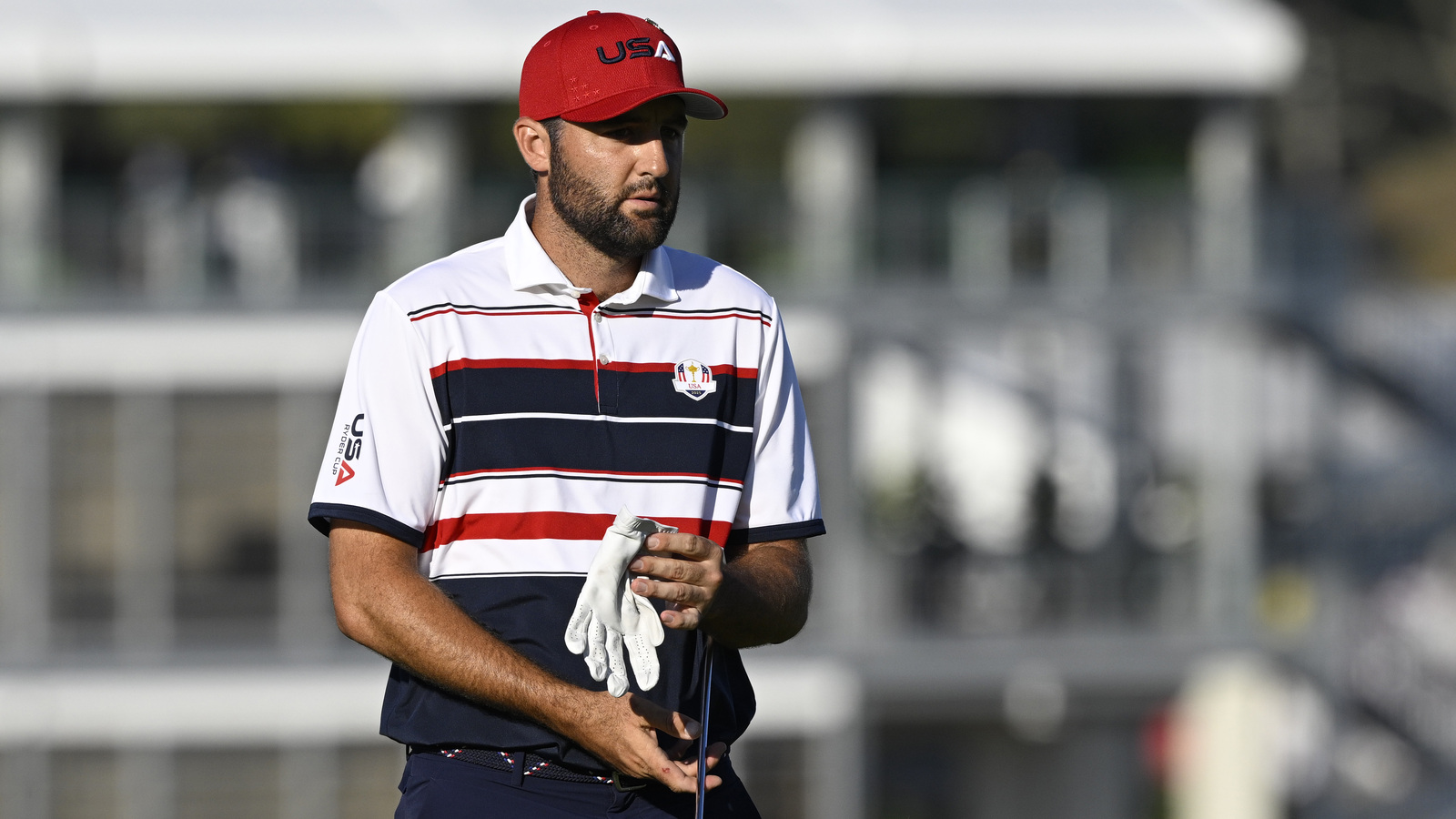Scottie Scheffler Reveals Urgent Calls He Made in a Last-Ditch Effort to Defeat Team Europe

When asked about the change on No. 1, Scheffler admitted the switch was not random. He and Russell Henley studied the course closely. “Russell and I felt like with the way the golf course had changed…” Scheffler began. The U.S. team had expected one style of play, but competition revealed something else.
Scheffler explained that length off the tee became more important than accuracy. “We had anticipated the golf course playing a certain way, and then things changed for us,” he said. Henley’s lower ball flight and iron play gave them confidence. “We felt like we had a better chance with his lower ball flight of getting the ball in close.”
The idea did not come from Scheffler and Henley alone. After Friday’s matches, their caddies, Teddy and Andy, studied the numbers. Scheffler recalled, “When we got done on Friday night…they had brought up the idea of us switching.” The more they reviewed the course, the stronger their conviction grew. “We felt pretty strongly that would give us a better chance, and I think it did.”
Scheffler also emphasized Henley’s accuracy. “Russell is a guy that hits a ton of fairways,” he explained. Yet conditions had changed the math. “The rough this week wasn’t as penal, I think, as we anticipated,” Scheffler noted. That shift made distance a weapon and accuracy less vital. For Scheffler, this adjustment showed “the ebbs and flows of really team golf.”
After explaining the tee-order switch, Scheffler faced another question. A reporter asked if stats staff influenced the decision. “Dumb question to follow up,” the reporter began. “Do you talk to the scouts guys, the stats people and get their opinion on that, or is that something you decide among yourselves?”
Scheffler shared how he sought guidance beyond the team room. “First person I called was—I think I called Gary and he didn’t answer,” he said. The call showed Scheffler trusted experienced players for input. Yet, when Woodland did not respond, he tried again.
“Then I called Webb and Webb answered (laughing),” Scheffler admitted. The humor revealed the pressure-breaking tone of their chat. He explained, “We talked through it for about three or four minutes.” That brief exchange gave him outside perspective at a critical time.
Scheffler even asked if scouts were present during the call. “Was one of the scouts in there? I don’t remember,” he said. His uncertainty showed how informal these strategy checks could feel in the Ryder Cup environment.
Keegan Bradley chimed in briefly. “I don’t either,” he responded when asked about scout involvement. The casual answers showed their reliance on personal trust, not just data sheets. Scheffler concluded, “It was just one thing that Russell and I felt like could give us a better chance.”
Even with advice and planning, Scheffler’s reflection circled back to execution. “I’d like to have that wedge shot on 18 back,” he admitted. The regret underscored how preparation only goes so far under Ryder Cup pressure.
Scheffler’s calls highlighted the Ryder Cup’s unique culture. Former players often guide current stars, even from outside the roster. This reliance showed how experience carries weight when pressure peaks. Woodland and Simpson represented continuity, voices that steadied Team USA beyond official leadership.
The moment also exposed golf’s tug-of-war between analytics and instinct. Scheffler openly admitted confusion about scout involvement, proving decisions are rarely clear-cut. While data matters, instinct and trust often steer choices. Ryder Cup pressure magnifies this balance more than regular Tour events.
Finally, Scheffler’s actions revealed leadership growth. As world No.1, he still admitted he needed advice. That honesty reflected humility, not weakness, and reinforced his role as a thoughtful anchor.
Scottie Scheffler’s Struggles in Ryder Cup Team Formats: A Statistical Analysis
Scottie Scheffler dominated individual tournaments in 2025 but struggled in Ryder Cup team play. At Bethpage Black, he lost all four matches. Scheffler entered the Ryder Cup as world No.1, fresh from victories at the PGA Championship and the CJ Cup. However, team formats have been challenging. His losses made him the first world No.1 to drop all four matches in a single Ryder Cup.
The struggles were most visible in foursomes and four-ball matches. Scheffler and Russell Henley lost both foursomes, winning only six holes out of 59 played. Even in four-ball matches with partners J.J. Spaun and Bryson DeChambeau, the Americans fell short.
Scheffler admitted, “Scheffler has now gone winless in his last eight Ryder Cup matches and has led only 3 of his 65 holes at Bethpage Black.” He added, “He became the first American ever to lose a match in each of the first four sessions.” These quotes underscore how difficult team formats can be, even for world-class players.
Despite his struggles, Scheffler’s individual skill remained undeniable. Analysts point out that while he excels in stroke play, alternate-shot formats magnify pressure and demand seamless coordination. His Ryder Cup results highlight the human element of team golf: preparation meets execution under intense scrutiny.
Scheffler’s performance at the 2025 Ryder Cup illustrates that success in golf is context-specific. Individual brilliance does not always translate to team dominance. Future Ryder Cups will test his adaptability and strategic approach under team pressure.
Scheffler at a Glance: 2025 Ryder Cup Stats
Category Stat Matches Played 4 Matches Won 0 Holes Won 3 of 65 Foursomes Holes Won 6 of 59 Four-Ball Matches 0 wins Historical Ryder Cup Record 0–6–2 (last two Cups) Notable First First world No.1 to lose all four matches in a single Ryder Cup
Despite world No.1 status, Scheffler struggled in team formats, highlighting the unique pressures of Ryder Cup golf.



